
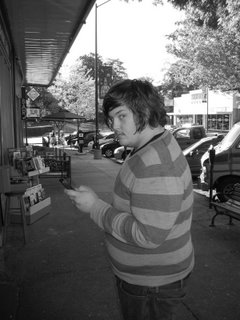
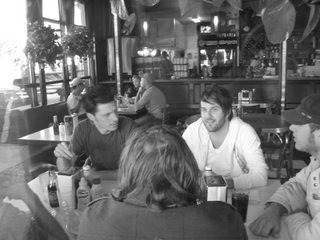

Energy. Music. Creativity.

| Sometimes the Sky's Too Bright by: Dylan Thomas |
| Sometimes the sky's too bright, Or has too many clouds or birds, And far away's too sharp a sun To nourish thinking of him. Why is my hand too blunt To cut in front of me My horrid images for me, Of over-fruitful smiles, The weightless touching of the lip I wish to know I cannot lift, but can, The creature with the angel's face Who tells me hurt, And sees my body go Down into misery? No stopping. Put the smile Where tears have come to dry. The angel's hurt is left; His telling burns. Sometimes a woman's heart has salt, Or too much blood; I tear her breast, And see the blood is mine, Flowing from her, but mine, And then I think Perhaps the sky's too bright; And watch my hand, But do not follow it, And feel the pain it gives, But do not ache. |





 Looking back on this night in Austin, I immediately think about the history that I've been cordially brought into, namely that of La Zona Rosa. I took this picture of Ruben Blades in our dressing room, and was humbled to be part of this legacy; that is, the legacy of playing some venues with significant history, such as Cain's in Tulsa, Knitting Factory in NYC, etc.
Looking back on this night in Austin, I immediately think about the history that I've been cordially brought into, namely that of La Zona Rosa. I took this picture of Ruben Blades in our dressing room, and was humbled to be part of this legacy; that is, the legacy of playing some venues with significant history, such as Cain's in Tulsa, Knitting Factory in NYC, etc.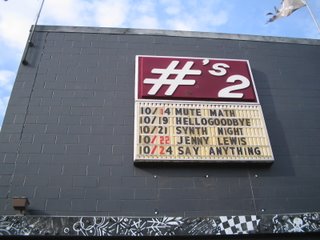 Another great Texas show, but with too much destruction at the end . . . bass amps fell and so did people . . . Darren wore a bass drum on his head at the end of the show.
Another great Texas show, but with too much destruction at the end . . . bass amps fell and so did people . . . Darren wore a bass drum on his head at the end of the show. 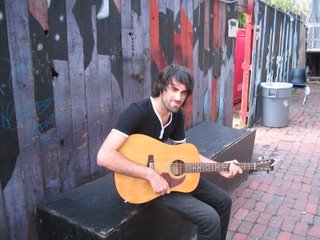
 Even though I haven't lived in Texas for several years now, I always feel like I'm coming back home when we play here, especially in Dallas since my family now lives in the area. I talked to my sister about why Texans are so proud about being Texans, and it is not always so clear. Were we brainwashed from an early age to think that this is the best state?
Even though I haven't lived in Texas for several years now, I always feel like I'm coming back home when we play here, especially in Dallas since my family now lives in the area. I talked to my sister about why Texans are so proud about being Texans, and it is not always so clear. Were we brainwashed from an early age to think that this is the best state? culture is diverse and so is the landscape (hills, deserts, beaches, big cities, etc); it may not as beautiful as other parts of the States, e.g. Oregon, Washington, and Tennessee (ha ha ha!). I'm sorry to admit. Nevertheless, I'm a proud Texan, and always will be.
culture is diverse and so is the landscape (hills, deserts, beaches, big cities, etc); it may not as beautiful as other parts of the States, e.g. Oregon, Washington, and Tennessee (ha ha ha!). I'm sorry to admit. Nevertheless, I'm a proud Texan, and always will be.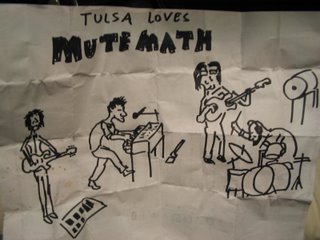 My favorite part of the set came during the end of "Break the Same" when Darren took his bass drum off his kit, handed it to someone along the front row, jumped on top of it as people held him up, and he played his little clicky/clicky part. I was floored to see Darren doing his thing as he floated on the crowd. He was crushing them with not only his drums, literally, but with his charisma.
My favorite part of the set came during the end of "Break the Same" when Darren took his bass drum off his kit, handed it to someone along the front row, jumped on top of it as people held him up, and he played his little clicky/clicky part. I was floored to see Darren doing his thing as he floated on the crowd. He was crushing them with not only his drums, literally, but with his charisma.
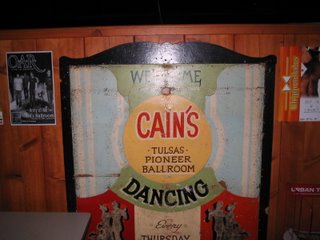 This being our second time at Cain's, I knew what to expect and was looking forward to it, that is, a historic venue with a unique vibe and energy. However, I really didn't expect the show to be one of the best of the tour.
This being our second time at Cain's, I knew what to expect and was looking forward to it, that is, a historic venue with a unique vibe and energy. However, I really didn't expect the show to be one of the best of the tour.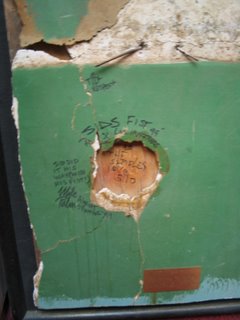 experience.
experience. this picture. They have taken that piece of dry-wall and framed it. This is just one of the many interesting things about this venue.
this picture. They have taken that piece of dry-wall and framed it. This is just one of the many interesting things about this venue.

 Just in case you didn't know, Rumba is a style of music, and in Cuba it has various forms.
Just in case you didn't know, Rumba is a style of music, and in Cuba it has various forms.
La instrumentación para la rumba
incluye tres tumbadoras (la tumbadora es un tambor inventado
 en Cuba que, a diferencia de los africanos, tiene llaves; se puede afinar, y escribir partituras. Hoy es universal) y dos palillos que repiquetean sobre una caja de madera.
en Cuba que, a diferencia de los africanos, tiene llaves; se puede afinar, y escribir partituras. Hoy es universal) y dos palillos que repiquetean sobre una caja de madera.
Dos de los tambores, (la tumbadora prima y el segundo o tres), marcan el ritmo básico; la tercera tumbadora llamada "quinto"(que se afina más alto), da los golpes improvisados, los floreos dirigidos a los bailarines.
 I love Cuban music, Cuban culture, and most of all, Cuban food. However, it's pretty sad and (some what insulting) when restaurants claim to have Cuban food, but they are not even in the ballpark. Unfortunately, I experienced this yesterday in Little Rock, but I'm going to leave it at that because everything else regarding this city, the
I love Cuban music, Cuban culture, and most of all, Cuban food. However, it's pretty sad and (some what insulting) when restaurants claim to have Cuban food, but they are not even in the ballpark. Unfortunately, I experienced this yesterday in Little Rock, but I'm going to leave it at that because everything else regarding this city, the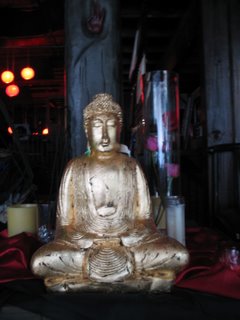 decorative venue, and the fans was wonderful. We had a surprisingly great turn out of enthusiastic people even though this was only our second time placing here; they definitely made me forget about my disappointing food experience. I guess I'm a bit of a snob when it comes to that, especially after being married to a beautiful women who can cook they real stuff. God, I miss my wife!
decorative venue, and the fans was wonderful. We had a surprisingly great turn out of enthusiastic people even though this was only our second time placing here; they definitely made me forget about my disappointing food experience. I guess I'm a bit of a snob when it comes to that, especially after being married to a beautiful women who can cook they real stuff. God, I miss my wife!
 I woke up to a lovely Sunday morning in St. Louis. As I walked around the area near the venue, I soon found a beautiful church that reminded me of many things: one, my days as un jovencito sitting in mass, staring up at the ceilings; two, my Catholic school days at Our Lady of Sorrows in McAllen, Texas; and three, my first visit to New Orleans in 1995 as a new student to Loyola University, in which I gazed at the immaculate beauty of the insides of the school's cathedral.
I woke up to a lovely Sunday morning in St. Louis. As I walked around the area near the venue, I soon found a beautiful church that reminded me of many things: one, my days as un jovencito sitting in mass, staring up at the ceilings; two, my Catholic school days at Our Lady of Sorrows in McAllen, Texas; and three, my first visit to New Orleans in 1995 as a new student to Loyola University, in which I gazed at the immaculate beauty of the insides of the school's cathedral.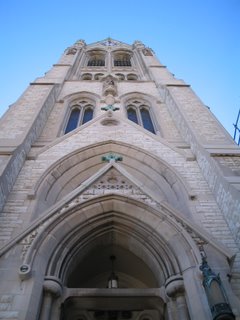 moving holy water. The sound allow was enough to make me take a deep breath and relax. The smells of the old wood floors and burning candles brought calm to me in the midst of a busy tour and even more hectic city outside the four walls of the special sacturary.
moving holy water. The sound allow was enough to make me take a deep breath and relax. The smells of the old wood floors and burning candles brought calm to me in the midst of a busy tour and even more hectic city outside the four walls of the special sacturary. God grant me the serenity
God grant me the serenity
to accept the things I cannot change;
courage to change the things I can;
and wisdom to know the difference.
Living one day at a time;
Enjoying one moment at a time; Accepting hardships as the pathway to peace; Taking, as He did, this sinful world as it is, not as I would have it;
Trusting that He will make all things right
if I surrender to His Will;
That I may be reasonably happy in this life
and supremely happy with Him
Forever in the next.
Amen.
--Reinhold Niebuhr
I walked out of the church with such a good vibe on my shoulders and
seemingly, nothing else. I tried to carry it on throughout the day and into the show.
I felt such a great energy and revitalization during the morning that I didn't wait to lose it; instead, I tried to retain it and pass it on to those around me, specifally via music.
As I played the show, I wanted people to feel the vibrations of that serenity I felt today. Like a dub line from a Bob Marley song or tumbao from Cachao, I desired to translate that positive energy into the hearts and soul of everyone around me. Hopefully, it did.

Up! up! my Friend, and quit your books;
Or surely you'll grow double:
Up! up! my Friend, and clear your looks;
Why all this toil and trouble?
The sun above the mountain's head,
A freshening lustre mellow
Through all the long green fields has spread,
His first sweet evening yellow.
Books! 'tis a dull and endless strife: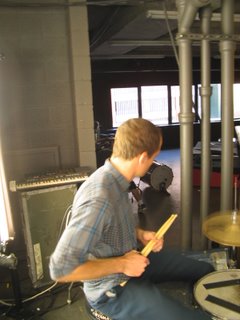 Come, hear the woodland linnet,
Come, hear the woodland linnet,
How sweet his music! on my life,
There's more of wisdom in it.
And hark! how blithe the throstle sings!
He, too, is no mean preacher:
Come forth into the light of things,
Let Nature be your teacher.
She has a world of ready wealth,
Our minds and hearts to bless--
Spontaneous wisdom breathed by health,
Truth breathed by cheerfulness.
One impulse from a vernal wood May teach you more of man,
May teach you more of man,
Of moral evil and of good,
Than all the sages can.
Sweet is the lore which Nature brings;
Our meddling intellect
Mis-shapes the beauteous forms of things:--
We murder to dissect.
Enough of Science and of Art; Close up those barren leaves;
Close up those barren leaves;
Come forth, and bring with you a heart
That watches and receives.

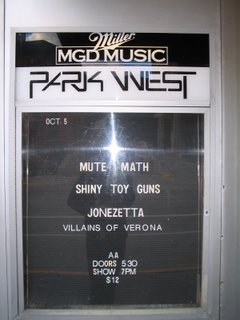 It was nice coming back to Chicago after not being there since Lollapalooza, my two-year anniversary. This is a wonderful city and it's amazing every time we are here.
It was nice coming back to Chicago after not being there since Lollapalooza, my two-year anniversary. This is a wonderful city and it's amazing every time we are here.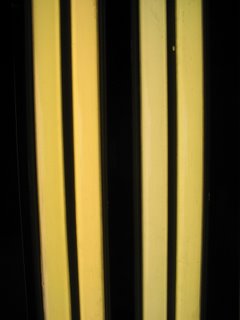
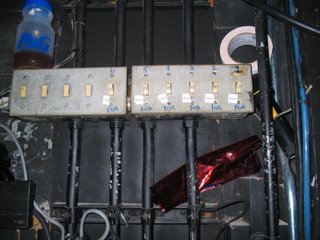
 I walked into the Bottleneck and was happy to find that the foul stench that was present here during our last visit was gone. I remember almost throwing up on stage because the intense mix of sweat, body odor, and that peculiar smell (a kin to that of an elephant's rear) was a bit much to handle; however, at this show, we still had some intense sweat and body odor, but nothing to write home about.
I walked into the Bottleneck and was happy to find that the foul stench that was present here during our last visit was gone. I remember almost throwing up on stage because the intense mix of sweat, body odor, and that peculiar smell (a kin to that of an elephant's rear) was a bit much to handle; however, at this show, we still had some intense sweat and body odor, but nothing to write home about.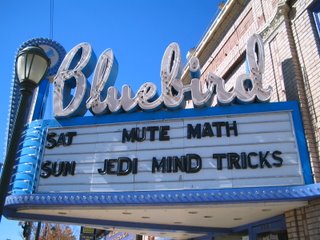 I equate the Bluebird Theater with magic and the supernatural; that is, the way the music hits me here is special and thrilling. I'm lifted to higher places; the music settles inside my being and rattles my soul.
I equate the Bluebird Theater with magic and the supernatural; that is, the way the music hits me here is special and thrilling. I'm lifted to higher places; the music settles inside my being and rattles my soul.
 What? We're playing on the same night as The Strokes and in the venue next door? This is it . . . I've always wanted to see them; they're a great band, but I've never been able to make it work. Anyway, tonight is no exception . . .
What? We're playing on the same night as The Strokes and in the venue next door? This is it . . . I've always wanted to see them; they're a great band, but I've never been able to make it work. Anyway, tonight is no exception . . .
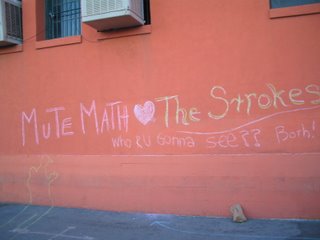 He got stares and some love. Some Strokes' fans got in on the fun, and wrote Mute Math on the wall as Darren wrote The Strokes . . . then it got ugly when somebody wrote vs. in between. However, Darren fixed all that be drawing a heart instead.
He got stares and some love. Some Strokes' fans got in on the fun, and wrote Mute Math on the wall as Darren wrote The Strokes . . . then it got ugly when somebody wrote vs. in between. However, Darren fixed all that be drawing a heart instead.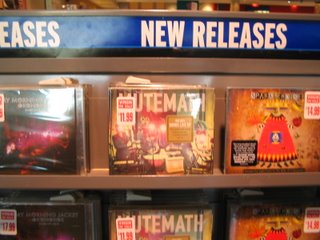 Celso Fonseca's brother, at a brazilian restaurant, about a year and a half ago.)
Celso Fonseca's brother, at a brazilian restaurant, about a year and a half ago.)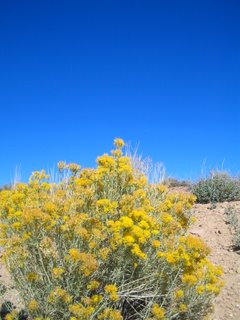 As I have mentioned before, days off are often the most difficult while on the road. This is mainly because I believe that if I'm out on the road, away from my family and home, I want to be working, not wasting time somewhere in the middle of the country. Thankfully, on this tour, we haven't had too many "off days" and on those days, we've haven't thrown them away by ill planning (another pet peeve of mine).
As I have mentioned before, days off are often the most difficult while on the road. This is mainly because I believe that if I'm out on the road, away from my family and home, I want to be working, not wasting time somewhere in the middle of the country. Thankfully, on this tour, we haven't had too many "off days" and on those days, we've haven't thrown them away by ill planning (another pet peeve of mine).
"Pausas II"
by Jose Gorostiza 1901-1973
No canta el. grillo. Ritma
la música
de una estrella.
Mide
las pausas luminosas
con su reloj de arena.
Trazasus órbitas de oro
en la desolación etérea.
La buena gente piensa
-sin embargo-
que canta una cauta
de música en la hierba.



